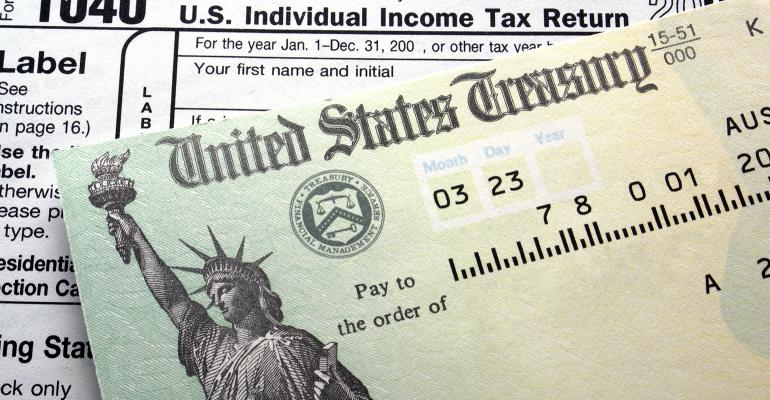In Estate of Russell Badgett, Jr. et al. v. Commissioner, T.C. Memo. 2015-226 (Nov. 24, 2015), the Tax Court addressed the issue of whether federal income tax refunds due to a decedent at the time of his death are includible in his gross estate. The court held that refunds are property interests and are included in a decedent’s gross estate for federal estate tax purposes.
The Tax Returns
The decedent, Russell Badgett, Jr., lived in Kentucky at the time of his death in March 2012. In April 2012, his estate filed a request for an extension of time to file the estate’s 2011 federal income tax return. In May 2012, the estate filed Russell’s 2011 individual income tax return, indicating $495,096 of tax due, total tax payments of $924,411 and an overpayment of $429,315. The return requested that $25,000 of the overpayment be applied to Russell’s estimated 2012 taxes and $404,315 be refunded. The Internal Revenue Service applied the $25,000 estimated payment to Russell’s 2012 federal income taxes and refunded $404,315 to the estate.
In December 2012, Russell’s estate filed a Form 706, but didn’t include the value of the 2011 federal income tax refund in the value of the gross estate. In April 2013, the estate filed a 2012 federal income tax return, indicating $10,874 of tax due, the $25,000 tax payment and an overpayment of $14,126. In May 2013, the IRS refunded $14,126 to the estate. In its Form 706 filed in 2012, the estate didn’t include the $14,126 refund in the value of the gross estate.
In January 2015, the IRS issued a notice of deficiency in estate tax of $146,454, based on the estate’s failure to include the value in Russell’s gross estate of the 2011 and 2012 federal income tax refunds.
Property Interests
Under Internal Revenue Code Section 2033, the value of a gross estate must include the value of all property. Under Morgan v. Comm’r, 435 U.S. 561 (194), to determine what constitutes a decedent’s interest in property, a court will first look to state law. In this instance, Russell’s estate claimed that under Kentucky law, to be subject to tax, property must be in existence on the tax assessment date and “cannot be a mere possibility or expectancy” (citing Commonwealth v. Travelers’ Ins. Mach. Co., 205 S.W. 561 (Ky. 1918). The estate argued that an overpayment doesn’t create a right to an income tax refund; there’s no property interest until the IRS declares that a refund is due. The estate further argued that even if it had an expectancy to a refund, under Kentucky law, an expectancy doesn’t suffice to rise to the level of a property interest.
The Tax Court disagreed, distinguishing all of the cases the estate relied on. Specifically, the court stated that In re Pigott, 330 B.R. 797 (Bankr. S.D. Ala. 2005) and Estate of Bender, 827 F.2d 884 (3d Cir. 1987), aff’g in part, rev’g in part 86 T.C. 770 (1987) involved taxpayers who had undisputed and unpaid tax liabilities that offset their respective tax overpayments. In both of those cases (which the estate relied on), the IRS had discretion whether to issue full refunds to the taxpayers under IRC Section 6402(c) to offset their tax liabilities. In the instant case, however, there’s no offsetting liability that exists. And, under Section 6402(c), if no offsetting liability exists, the IRS “shall” refund the balance to the taxpayer. Thus, said the Tax Court:
The status of the tax refund is more than a mere expectancy; the estate has the right to compel the IRS to issue a refund for the years for which decedent overpaid his tax. Thus, we hold that the overpayments in question attained the status of independent assets for estate tax purposes; they constitute decedent’s property for estate tax purposes.
The estate further argued, however, that a taxpayer doesn’t have a legal right to a refund until he files a successful lawsuit against the IRS for that tax refund after all conditions precedent are met. The Tax Court disagreed, finding that the cases the estate relied on for this argument merely discuss how to prosecute a tax refund action; they don’t support the estate’s claim.
Notice of Deficiency Upheld
Thus, the Tax Court held that Russell’s estate had a property interest in the value of the 2011 and 2012 federal income tax refunds. As such, those refund amounts should have been included in the value of the gross estate for federal estate tax purposes. Accordingly, the estate was liable for the $146,454 estate tax deficiency.






